Theory Research
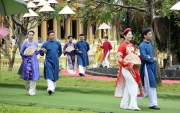
Ho Chi Minh’s thought on developing the Vietnamese people is the culmination and development of our nation and human values
Assoc. Prof., Dr. NGUYEN THI KIM DZUNG
Dr. NGUYEN LUONG UYEN
Institute of Ho Chi Minh and Party leaders,
Ho Chi Minh National Academy of Politics
(PTOJ) - Ho Chi Minh’s thought on developing the Vietnamese people represents a comprehensive and profound system of views on the role of humans, the purpose, contents, and methods to develop people. This system is a great and valuable spiritual asset of the Party and our nation, serving as the ideological foundation and guiding principle for the Party’s guidelines and policies on comprehensively developing the Vietnamese people. This article outlines the basis of the formation and theoretical value of Ho Chi Minh's thought on developing the Vietnamese people.
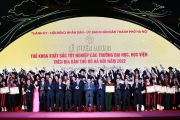
Utilizing and developing talents according to Ho Chi Minh's thought
Dr. NGUYEN DUY QUYNH
University of Social Sciences and Humanities,
Vietnam National University, Hanoi
(PTOJ) - Developing talents is a national task of every country related to the development of the country and the survival of the nation. This article contributes to clarifying the outstanding contributions made by Ho Chi Minh in the field of talent development. These are important guidelines to help the Party and State set out policies to utilize and develop talents, serving the cause of national construction and development in the current period.
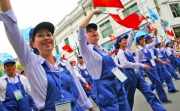
The nationality issue in the Communist Party Manifesto and its significance for the current Vietnamese revolution
ASSOC. PROF., DR. HO TRONG HOAI
Institute of Scientific Socialism,
Ho Chi Minh National Academy of Politics
(LLCT) - In today's world, wars, and conflicts, including ethnic conflicts are occurring in a highly complex manner. Therefore, joining hands to resolve that conflict in the direction of ensuring the genuine interests of the nations is the aspiration of progressive mankind. On the occasion of the 205th anniversary of Karl Marx's birth and the 140th anniversary of his passing, this article analyzes the basic arguments on the national issue in the Communist Party Manifesto and affirms their values for the current Vietnamese revolution.
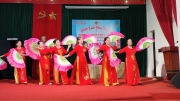
Significance of the lessons: “The people are the root” and “The people are the center” in arousing and realizing the “aspiration to develop a prosperous and happy country”
PROF., DR. TRAN VAN PHONG
Ho Chi Minh National Academy of Politics
(PTOJ) - This article analyzes and enumerates five meanings regarding the lessons “The people are the root” and “The people are the center” in arousing and realizing the “aspiration to develop a prosperous and happy country”: They are the basis and foundation for arousing and realizing this aspiration; they are the inner strength for arousing and realizing this aspiration; the people are the subjects who spark and realize this aspiration; serving the interests of the people is the goal of arousing and realizing this aspiration; the leadership of the Party is the key factor determining the success in arousing and realizing this aspiration.
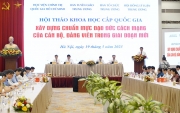
The sustainable value of Ho Chi Minh's moral thought
Assoc. Prof., Dr. TRAN MINH TRUONG
Ho Chi Minh National Academy of Politics
MA. NGO THI HAO
Lao Cai School of Politics
(PTOJ) - Ho Chi Minh's moral thought - a value system distilled, supplemented, and developed from the good values of traditional national and human moralities; illuminated by the worldview and methodology of Marxism - Leninism, thus having universal and sustainable value. Ho Chi Minh's moral thought became a great force behind the victory of the Vietnamese revolution. At the same time, it contributed to the struggle for peace, democracy, and progress for all mankind. The world has and will continue to change, but Ho Chi Minh's moral thought will forever remain with the nation and the times.

Improve endogenous capacity in science and technology for promoting industrialization and modernization
DR. NGUYEN THI MIEN
Ho Chi Minh National Academy of Politics
MA. DOI GIA THIEN LINH
Hanoi National University of Education 2
(PTOJ) - The cause of industrialization and modernization in our country thus far has achieved important achievements of great significance, in which a significant contribution is made by those in the fields of science and technology. This article analyzes the role and situation of science and technology development in our country, and on that basis, proposes solutions to improve the endogenous capacity in science and technology, to promote the industrialization and modernization of the country, aiming to achieve the goal of Vietnam becoming a developed country, with modern industry by 2030, and a developed country with high income by 2045.
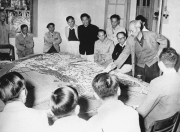
The unique and distincitve political thought of Ho Chi Minh
Assoc.Prof., Dr. BUI DINH PHONG
Ho Chi Minh National Academy of Politics
(PTOJ) - Politics emerged with the division of society into classes and the formation of states. This is a complex concept with broad connotations and various interpretations and definitions. The article focuses on analyzing Ho Chi Minh's political thinking on the basis of both being loyal to the stance and views of Marxism - Leninism and being unique and distinctive.
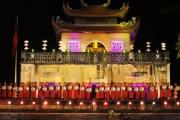
From the Cultural Outline of Vietnam in 1943 to the current Party guidelines for building and developing culture
Assoc.Prof.,Dr. NGUYEN TRONG PHUC
(PTOJ) - The Cultural Outline of Vietnam in 1943 is an invaluable historical document with special significance for the Vietnamese revolution. It provided a roadmap for the development of a new Vietnamese culture that would contribute to the struggle for national liberation and nation-building. After 80 years, the ideas of the Cultural Outline still hold value and have been used, supplemented, and improved upon by our Party in the construction and development of an advanced Vietnamese culture that is deeply rooted in our national identity, and meets the demands of the renovation and international integration process.
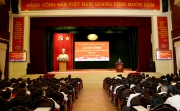
Viewpoints of President Ho Chi Minh on cadre evaluation and its application by our party during reform period
MA. PHAM THI VINH HA
Political Theory Journal,
Ho Chi Minh National Academy of Politics
(PTOJ) - Our Party and President Ho Chi Minh have always been determined that the contingent of cadre play a key role in the revolutionary cause. As a result, they have always paid attention to the work of building a contingent of cadres that meet the mission requirements. Cadre evaluation is an important stage in this process. The article clarifies President Ho Chi Minh's views on cadre evaluation, including the methods and purposes of evaluating cadres, promoting evaluation results, and handling weak, insufficiently competent, or non-compliant cadres. Those views are also the guidelines for today's cadre personnel work.
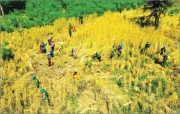
People are placed at the center - a principle in the activities of Vietnam’s political system
(PTOJ) - People being placed at the center of the political system is one of the core viewpoints of the Communist Party of Vietnam. This is consistently shown in the book titled “Some theoretical and practical issues about socialism and the path to socialism in Vietnam” by General Secretary Nguyen Phu Trong and in the Documents of the 13th National Party Congress. This article analyzes the connotation and the theoretical basis of the point of view "People are placed at the center". Furthers, it expands on some basic conditions for good implementation of this principle in the activities of Vietnam’s political system.
Universal and unique values in the theory of the Communist Party of Vietnam on socialism and the path to socialism over 35 years of renovation
(PTOJ) - The theoretical developments of our Party during the renovation period on socialism and the path to socialism in Vietnam have contained universal values, and at the same time clearly demonstrated the specificity of Vietnam. This article initially outlines the most prominent values in our Party's theory, demonstrating the universality and commonality of all countries in building socialism and the specificity of socialism, and the path to socialism in Vietnam.
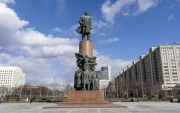
Perseverance in the path of the October Revolution, constant creativity in reform and innovation to implement socialist goals
(PTOJ) - On the occasion of the 105th anniversary of the Great October Socialist Russian Revolution, it is necessary to affirm that socialism has been perseverant and creative since its birth as a scientific theory (1848) and a social system (1917). As a result, socialism has become one of the determining forces in movements and trends of the contemporary world. Perseverance in the way opened by the October Revolution, since 1991, the fight for socialism has been implemented by the world socialist movement via the processes of successful reforms and renovations, opening a new page of history in the battle of "who wins whom" in the current period.

Aspirations for the country’s development in the book by General Secretary Nguyen Phu Trong
(PTOJ) - The book by General Secretary Nguyen Phu Trong covers many theoretical and practical issues about the renovation policy, the development of the country in the fields of politics, economics, culture, society, foreign affairs, national defense and security. Through this book, General Secretary Nguyen Phu Trong has identified the country's development goals, aspirations, directions and measures needed to realize the country's development aspirations.
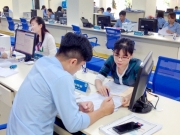
Renovation of organizational and operational model of local governments in the spirit of the 13th National Party Congress
(PTOJ) - The organizational and operational model of local governments in our country is constantly being renovated. The decentralization among central and local governments has improved, localities have more autonomy and policy space to realize their development goals. The effectiveness and efficiency of local governments’ operations have improved and been enhanced. However, besides the achieved results, the organization and operation of local governments still shows many limitations. This article analyzes and evaluates the current situation and proposes some solutions to continue renovating the organizational and operational model of local governments in the spirit of the Resolution of the 13th National Congress.
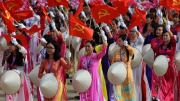
Marxist - Leninist philosophy’s views on social consciousness and its meaning to the building of new social consciousness today
(PTOJ) - Social consciousness is an important content of Marxist - Leninist philosophy. A thorough understanding of this issue is of great significance to building new social consciousness, thereby contributing to the success of building a socialist-oriented nation with prosperous people, a strong country, and a democratic, equitable, and civilized society.
Journal Archives
Journal Archives
Media
Photo Gallery
Contact us

 Theory Research
Theory Research


